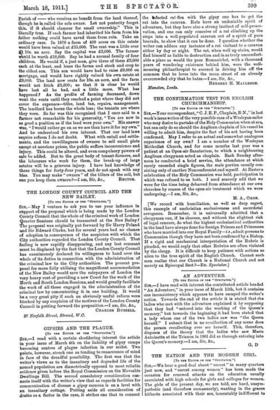THE BREAK-UP OF BIG ESTATES.
[To THE EDITOR OF THE "SPECTATOR."]
SIR,—Your righteous article on the break-up of big estates, in last week's issue, opens out a question that deserves deep consideration. I hold no brief for landlords. But at a time when they have suffered beyond all other classes, and have at the same time saved others from suffering with themselves, they are being bitterly assailed as evildoers. You say, and truly say, " the tenant on a good estate has really greater security than if he were a freeholder." Freeholders have been ruined wholesale during the last thirty years, whilst tenant- farmers have weathered the storm. In a parish note-book, kept for the benefit of those who come after, I find this record, in my own handwriting, in the year 1898: "Let it be re. corded, for the instruction of those who come after, that this Parish has, of late years, been saved from ruin by the generous action of—, Lord of the Manor, of whom it maybe truly said that he is the only person connected with tke
Parish of — who receives no benefit from the laud thereof, though he is-called the sole owner. Let not posterity forget this, if it should clamour for small ownership." This is literally true. If each farmer had inherited his farm from his father nothing could have saved them from ruin. Take an ordinary case. In 1870 a farm of 400 acres on this estate would have been valued at £15,000. The rent was a little over O. 10s. an acre. Say the capital was £3,000. The farmer Would be worth £18,000. Say he had a normal family of four children. He would if, a just man, give three of them £3,000 each at the least, and lease the farms and stock and crop to the eldest son. This son would have had to raise £9,000 on mortgage, and would have rightly valued his own estate at £9,000. The land now rents for 10s. an acre, and the farm would not fetch £5,000; so that it is clear he would have lost all he had, and a little more. What has happened P As the profits of farming decreased, down went the rents until they reached a point where they did not cover the expenses—tithe, land tax, repairs, management. The landlord has borne the whole loss; the tenants are where they were. So far was this recognised that I once said to a farmer not remarkable for his generosity, " You are now in as good a position as if the land were your own." His answer Was, " Pwould rather go on as we are than have it for my own." And he understood his own interest. That our land laws require reform I do not doubt. What with entail and settle- ments, and the unwillingness of owners to sell small plots except at usurious prices, the public suffers inconvenience and injury. This could be altered, and even compulsory powers of sale be added. But to the great body of tenant-farmers, and the labourers who work for them, the break-up of large estates will be a grievous injury. I have had knowledge of these things for forty-four years, and do not speak with any bias. You may make " owners " of the tillers of the soil, but can you keep them owners P—I am, Sir, &c., RECTOR.











































 Previous page
Previous page